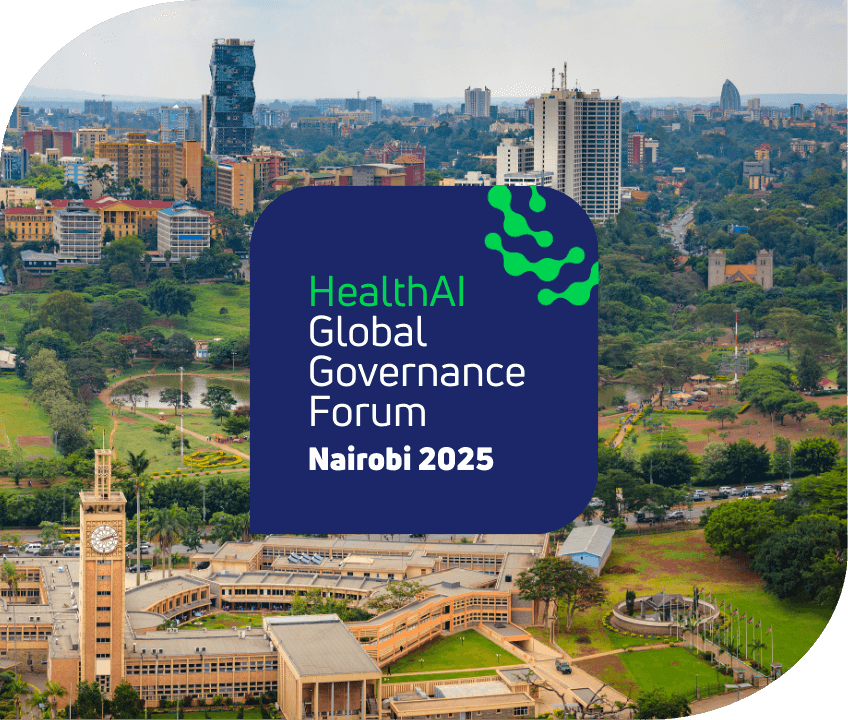HealthAI Global Governance Forum 2025: Building Trust in AI for Health

About the Forum
The HealthAI Global Governance Forum (HealthAI GGF) is an annual, flagship event that gathers global actors at the forefront of health, responsible AI, and governance.
Participation in the Forum is free and open to a broad range of stakeholders —from policymakers and regulators to academics, innovators, civil society, and the private sector.
The HealthAI GGF is designed for inclusive participation, and offers a unique platform for exchanging knowledge, shaping global policy, and promoting equity in AI for health. By spotlighting regulatory innovation, advancing thought leadership, and fostering international collaboration, the Forum aims to become the definitive global gathering on AI governance in health.


What to Expect
Our Programme at a Glance
The HealthAI Global Governance Forum will bring together high-level voices and experts shaping the future of AI governance in health. We are honoured to feature keynote addresses from H.E. Ambassador Philip Thigo (Kenya), Dr. Delese Mimi Darko (African Medicines Agency), and Dr. Mazyanga Lucy Mazaba Liwewe (Africa CDC), alongside senior officials from the Ministries of Health and regulatory authorities of our expanding Global Regulatory Network.
The agenda below reflects this truly global dialogue across regions and institutions shaping the future of AI governance in health.
Session 1: Strengthening Health Data Governance for Responsible AI in Health: Aligning Agendas for Ethical, Equitable and Effective Data Use
1h15m | Panel Discussion | Operationalizing Principles
Health data is the foundation for AI systems in health, but how it is governed determines whether innovation serves the public good. This session brings together national leaders, industry and global experts, and community voices to explore how countries can build stronger, more inclusive frameworks for data governance. It highlights emerging tools, policies, and initiatives that are advancing responsible data use and driving convergence between technical, ethical, and political approaches.
Participants will examine how aligning data and AI governance can accelerate the operationalisation of global principles and strengthen legislative and regulatory systems. Through country experiences and lived realities, the session will spotlight practical pathways for regional and global cooperation on secure, ethical, and equitable data use. It will also include approaches for fair data sharing and cross-border collaboration that leave no one behind.
Panelists:
Mathilde Forslund: Transform Health (led by)
Eric Sutherland: OECD
Shweta Bhardwaj: Johnson & Johnson
Garrett Mehl: World Health Organization
Session 2: From Voice to Action: Youth-Led Approaches for Inclusive AI in Health
1h15m | Workshop | Stakeholder Engagement
Young people are among the most affected by digital transformations in health, yet their voices are rarely integrated into AI governance. This session spotlights how youth can become co-creators of equitable and rights-based AI systems, rather than passive recipients of their outcomes. The keynote will highlight global youth-led initiatives, showing how medical students and emerging leaders are building AI literacy, ethical awareness, and governance capacity from the ground up.
Building on this, the workshop will introduce a practical method for embedding youth health, rights, and participation into AI governance structures. Through collaborative exercises, participants will explore what it means to design oversight mechanisms that centre care, intergenerational equity, and meaningful participation, helping reimagine the future of AI in health through the eyes of the next generation.
Speakers:
Kana Halić Kordić: International Federation of Medical Students’ Associations – IFMSA
Shajoe Lake: Digital Transformations for Health Lab (DTH-Lab) – Research Fellow.
Jai Ganesh Udayasankaran: Asia eHealth Information Network (Session Host)
Session 3: Scaling Responsible AI for Health: Lessons from the Frontlines
1h15m | Flash talks + dialogue with innovators | Scaling Responsible Use of AI in Health
Scaling AI in health goes far beyond technology, it requires trust, equity, and the ability to adapt solutions to diverse real-world contexts. This session highlights pioneering initiatives from across the globe that are translating responsible AI principles into tangible impact on the ground. From mental health and maternal care to diagnostics and disease surveillance, these examples demonstrate how ethical design, community participation, and context-sensitive innovation drive meaningful adoption.
Through a series of practical case reflections, participants will explore with the innovators what it takes to scale responsibly: from inclusive data practices and equitable partnerships to governance mechanisms that ensure accountability as innovations grow. The session offers a real-world view at how health systems and innovators can bridge the gap between experimentation and sustainable, trustworthy AI integration at scale.
Speakers:
Aryan Chaudhary: BioTech Sphere Research , India | Unit of NeoNexus Healthcare Pvt Ltd
Ahmad Watsiq Maula: Universitas Gadjah Mada (UGM)
Nadine Sabra: Global Health Institute, American University of Beirut
Prithviraj Pramanik: George Institute for Global Health
Shubs Upadhyay: Global Perspectives on Digital Health Podcast
Valentine Kamau: AI Health beat Africa Podcast
Session 4: Positioning AI Governance in National Health Strategies: From Global Lessons to Hands-On Practice
1h15m | Workshop | Capacity Strengthening
This session explores how countries can effectively translate global AI governance frameworks into national health strategies that reflect local needs and realities. Keynotes will present regional perspectives: a keynote will examine how AI safety frameworks such as the EU AI Act, NIST, and China’s models can be adapted to the Global South, followed by a presentation that will share lessons from applying a regional maturity model to benchmark AI adoption and governance in Latin America and the Caribbean.
In the second half, an interactive exercise led by Amp Health will bring these insights into practice. Participants will work collaboratively through a real-world AI use case, simulating how ministries of health can co-develop governance frameworks that safeguard safety, inclusion, and sustainability – bridging the gap between global principles and national implementation.
Speakers:
Fernando Bonilla Sinibaldi: RECAINSA
Karthik Adapa: WHO South East Asia Regional Office
Shola Dele-Olowu: Amp Health
Kirsten Mathieson: Transform Health (Session Host)
Session 5: Innovative Pre-Market Approaches to Validate and Regulate AI in Health
1h15m | Panel Discussions | Scaling Responsible Use of AI in Health
AI is transforming how health technologies are developed and deployed, challenging traditional approaches to validation and regulation. This session explores how regulators around the world are adapting Software as Medical Device (SaMD) regulations to keep pace with fast-moving innovation while safeguarding safety, effectiveness, and trust. Drawing on diverse national experiences, it examines how adaptive and risk-based approaches can help ensure AI systems meet rigorous standards without stifling progress.
Participants will also learn about emerging tools and frameworks that enable innovation within safe boundaries, from living labs and regulatory sandboxes to cognitive trust models and evolving health technology assessment methods. The discussion will shed light on how forward-looking regulatory ecosystems can foster continuous learning, strengthen confidence in AI applications, and support responsible adoption at scale.
Speakers:
Adriana Banozic: Nanyang Technological University, School of Social Sciences, PPGA
Natasha Motsi: Medicines and Healthcare Products Regulatory Agency
Paul Campbell: HealthAI
Rado Andrian: HealthAI
Raymond Chua: Health Sciences Authority
Stephen Gilbert: TU Dresden
Session 6: Participatory AI Governance: Civil Society Voices and Global Principles
1h15m | Workshop | Stakeholder Engagement & International Cooperation
Inclusive governance is a cornerstone of human rights, yet participation from civil society remains limited in the development and oversight of AI for health. This session explores how lessons from past global health movements and current grassroots experiences can inform more accountable and people-centred AI governance. It highlights how community-led approaches have successfully reshaped health systems by demanding transparency, representation, and equity, principles that are transferable to the governance of AI.
Building on these insights, participants will engage in an interactive dialogue to co-develop shared principles for the responsible adoption of AI in health. The exercise invites diverse perspectives to refine a global declaration, helping ensure that future AI frameworks are grounded in rights, inclusion, and the lived realities of those most affected by technological change.
Speakers:
Eric Sutherland: OECD (presenter and session host)
Rajnish Prasad: UN Women
Sara (Meg) Davis: University of Warwick
Session 7: Role of Non-State Actors in Advancing AI Governance in Health
1h15m | Panel Discussions | Stakeholder Engagement
While AI’s potential to benefit health and advance global well-being is immense, realizing these benefits depends on fostering multi-stakeholder ecosystems to promote innovation and adoption of safe and effective AI solutions. If not developed responsibly, AI can endanger patients, transgress privacy, and increase global healthcare disparities. To overcome AI’s potential risks, local and global policymakers must establish policies and governance mechanisms to safeguard AI’s integration into healthcare, but they must be responsive to societal and global considerations, and agile enough to adapt to technological changes.
This session seeks to explore how non-state actors can contribute to advancing Responsible AI in health ecosystems, which will promote investments, foster innovations and build trust, with agile and effective regulations. This event will bring together global thought leaders, international organizations, academia, civil society and the private sector to engage in an open dialogue on the role of each sector in advancing AI governance in health.
Panelists :
Amanda Leal: HealthAI (led by)
Agnes Kiragga: APHRC
Caroline Mbindyo: AMREF
Christian Wickert: Merck KGaA
Kathryn Toure: IDRC
Session 8: When AI in Health Fails: A Framework for Detection, Diagnosis and Response
1h15m | Workshop | Operationalizing Principles
As AI systems become deeply integrated into clinical workflows, new types of failures—technical, functional, and clinical—pose complex risks to patient safety and public trust. This session reimagines how health systems can move beyond traditional regulatory models to detect, diagnose, and respond to these failures in real time. It explores how continuous monitoring, post-market surveillance, and performance audits can strengthen oversight of adaptive AI while preserving the agility needed for innovation.
Participants will work through a practical framework for identifying early warning signals, diagnosing root causes, and implementing transparent, system-level responses when AI tools underperform or malfunction. By applying structured audit and learning processes to a real-world case study, the session offers concrete pathways to ensure that AI in health remains safe, accountable, and resilient throughout its lifecycle.
Led by:
David Lowe: Centre for Excellence in Regulatory Science and Innovation in AI & Digital Health
Aditya Kale: Centre for Excellence in Regulatory Science and Innovation in AI & Digital Health
Networking and Global Exchange
The HealthAI Global Governance Forum will bring together people from around the world who are shaping how AI is used in health—regulators, policymakers, researchers, innovators, and civil society alike. Beyond the sessions, the day is designed to make real connections possible, giving participants the chance to share experiences, compare approaches, and spark new collaborations across borders.
Conversations will continue throughout coffee breaks and lunch, and carry into the evening with a closing cocktail reception. It’s an opportunity to unwind, exchange ideas in a more informal setting, and strengthen the relationships that make this global community so dynamic.
Speakers
Event Venue
The GGF will take place at the Trademark Suites in Nairobi, Kenya
Hotel rooms at the HealthAI Global Governance Forum venue may be reserved on their website.
Transportation & Transit
Nairobi is serviced by the Jomo Kenyatta International Airport. The distance from the airport to the Trademark Suites is 28 Km.
Address: Kathini Avenue, off Redhill Road, Nyari, 00100 Nairobi
Taxis are available at the airport; please use an official airport taxi. The journey should take approximately 35 minutes depending on traffic. Agree on the price before parting. Uber is easily accessible within the airport and for moving around Nairobi.
Visa Requirements
The Government of Kenya has amended their visa regulation in January 2024 by introducing the Electronic Travel Authorization (eTA) where all foreign nationals traveling to Kenya are required to complete the eTA prior to travel to Kenya.
All Participants are required to apply for a visa through the eTA portal (https://www.etakenya.go.ke/en/evisa.html) and submit their online application prior to travel to Kenya.
Travelers can submit their applications up to 3 months prior to travel and must apply at the latest 7 days prior to travel to ensure adequate time for processing and issuance of the eTA.
Information on eTA requirements can be found on the web site of the Directorate of Immigration & Citizen Services of the Ministry of the Interior and National Administration of the Government of the Republic of Kenya at the following link: https://www.etakenya.go.ke/en/evisa.html
Health Requirements
Yellow Fever Vaccination is a requirement for entry to Kenya. If you don’t have the vaccination certificate, please ensure to get vaccinated 10 days prior to your travel and they issue you with a valid certificate.
Risk of Malaria exists throughout the year in the whole country, including game parks, the city of Nairobi and in the highlands at altitudes above 2,500 m of Central, Eastern, Nyanza, Rift Valley and Western provinces.
Please note that tap water is not safe to drink in Kenya, however, bottled water is readily available.
Security Information
Nairobi is generally a safe city. However, like in any other country, reasonable precautions should be taken. Remain vigilant, and always stay alert and conscious of your surroundings when going about your activities. Crime ranges from petty theft to kidnapping, mobile phone fraud, and carjacking.
Some precautions are as follows:
- Stay alert in locations frequented by tourists/foreigners
- Keep your passport, traveler’s cheques, excess money and any other valuables locked in the hotel’s safe. Do not carry a lot of cash with you or wear expensive jewelry
- Always carry a copy of your passport and visa (if applicable)
- Do not walk on your own at night
- Do not physically resist any robbery attempt
- Monitor local media for breaking events and be prepared to adjust your plans
Make contingency plans to leave the country in the event of an emergency - Avoid travel in the areas within 100 kms of the following borders: Somalia, Ethiopia and South Sudan.
For more specific security advice both before and during the meeting, please check your national Foreign Office travel advisory for Kenya.
General Information
- All major forms of credit cards are accepted in Kenya. Banks and Bureau de Change are available at the airport and in most shopping malls.
- Banks are open in general from Monday to Friday between 9 a.m. and 4 p.m., and Saturdays between 9 a.m. and 12 p.m. Kindly note that banks are closed on Sundays and public holidays. ATMs with multinational financial services are available in most of the shopping malls.
- The voltage in Kenya is 220 – 240 volts. The sockets require a 3 square pin plug.
- The official language of the forum is English.
- Weather: The average temperature in Nairobi is 18ºC in December, with highs of 23ºC and lows of 12ºC.
- Local time: The time zone in Nairobi is GMT+3

Road to AI Impact Summit 2026
The HealthAI Global Governance Forum is an Official Pre-Summit Event of the AI Impact Summit 2026
